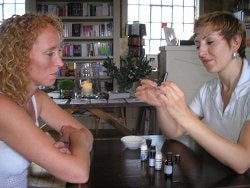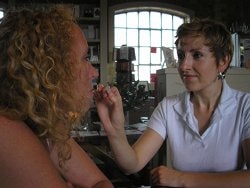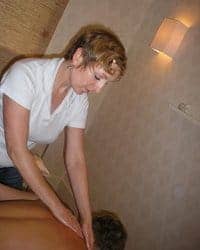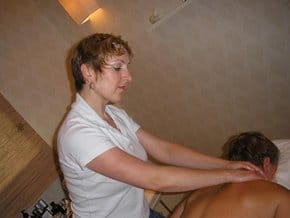An aromatherapist is trained in the use of plant extracts – known as essential oils – to improve a patient’s health and sense of well-being.
The use of aromatic plant oils in medicine was first recorded in the book Da Materia Medica from the first century, and plant extracts have been used to treat illness since time immemorial.
However, aromatherapy as we know it today was developed in France in the 20th century with the support of several noted scientists of the time, one of whom cured a serious burn to his hand with the use of lavender oil.
Since then, the interest in complimentary medicine and natural remedies as an alternative to synthetic drugs has continued to grow.
Today, registered aromatherapists are found all over the UK and the rest of the world.
After training in the art of aromatherapy, they blend essential oils and administer them to their patients to improve health and provide other physical and mental benefits.
Salary
Aromatherapists are usually self-employed and work on an hourly rate from £20 to £50 per treatment.
There are many overheads involved, such as the cost of essential oils and room hire in a clinic.
As such, an experienced aromatherapist with a solid client base can earn between £20,000 and £35,000 per annum.
Aromatherapists may earn more money by owning their own clinic and hiring out rooms to other practitioners.
Many aromatherapists work part-time with another job to supplement their income.
Responsibilities
An aromatherapist’s job includes the following duties:
- Taking a detailed patient case history
- Choosing the correct essential oils for that patient
- Creating a bespoke blend for the treatment session
- Administering the oils to the patient’s body via massage, inhalation or through bathing at home
- Keeping patient records
- Devising a continuous treatment plan over several sessions
- Referring patients to other health practitioners if and when necessary
Qualifications

There are many different aromatherapy courses available in the UK.
Some are basic courses intended to give an introduction for those wishing to use aromatherapy in their own circle of family and friends.
However, to practice as a registered aromatherapist you must complete a course that meets the guidelines of the NOS (National Occupational Standards) for aromatherapy.
For more information on accredited aromatherapy courses see the Aromatherapy Council website.
A course usually takes place over a year and includes studies in plant properties, anatomy, business studies, therapeutic relationships, research and case studies.
Once you have completed a course you can apply to be registered with the CNHC (Complimentary Medicine and Healthcare Council).
Skills
Aromatherapists benefit from the following personal attributes and abilities:
- A patient and calm manner
- Empathy to listen to the needs of patients
- An interest in botany and the study of plants
- A desire to help others achieve positive change in their lives
- Great organisational skills
- Excellent record keeping
- An understanding of the limit of one’s own medical abilities
Working Conditions

Aromatherapists usually work from within a clinic where they hire out a room.
Often the clinic offers other complimentary or alternative medicine treatments such as Reiki, various types of massage and acupuncture.
Some aromatherapists may prefer to work from home where they will dedicate a room to be their private clinic.
Alternatively, aromatherapists travel to visit their patients in their own homes, in hospitals or hospices.
An appointment usually lasts between 40 and 75 minutes.
Aromatherapy involves the use of specialist equipment, not least of which is the essential oils.
These are plant compounds extracted by various means and purchased in concentrated form.
These oils must be administered as necessary, often by being mixed and diluted with a carrier oil to make them suitable for massage.
As aromatherapists are usually self-employed they are free to make up their own hours.
Early morning and evening appointments are common in order to fit around a patient’s work schedule.
Part-time work is also common, especially in the early years of an aromatherapist’s career.
As the work is hands-on and face to face it can be tiring dealing with people’s personal problems.
However, bringing about positive change is immensely rewarding and most aromatherapists go into the career for these reasons rather than for the money.
Experience
Aromatherapy courses usually include a large amount of practical study through working on human subjects, so enough experience is normally gained on the course to start practising upon graduation.
Additional experience can be gained by treating family and friends which can also help build up a network of clients.
Employers
Alternative medicine clinics are the largest employers of aromatherapists.
Check your local listings and apply directly.
Alternatively, take out an advert in your local community centre, health food store or newsagent.
Career Progression
It is common for practitioners of complimentary medicine to qualify in more than one discipline.
An additional qualification not only affords an extra revenue stream but provides another medium of treatment for your patients.
The ability to provide deep tissue, Indian head, or sports massage opens up an entirely different client base.
Image

Also known as…
- Aromatherapist
Related Jobs
- Massage therapist
- Reiki therapist
- Reflexologist
- Acupuncturist
What’s it really like?
Tanya Moulding, 40, is an aromatherapist working in London who has her own website, Aromatic Alchemy
How long have you been working as an aromatherapist?
Well, I trained about 15 years ago with the Tisserand Institute, an aromatherapy training school, and my course took two years part-time.
After the course I practiced on friends and did voluntary work, and then worked part-time for about five to eight years.
To supplement my income I had an office job working in advertising and marketing.
What did you do before this job?
I worked in human resources.
I was a personnel manager for about four years.
What do you do in a typical day at work as an aromatherapist?
That’s a difficult one as no days are typical.
But theoretically one would start with me checking my appointments and checking my room, checking whether I have everything I need such as towels, couch roll, bins and water, and making sure the fan works.
Then I get my client list ready and check to see if there are any new clients.
If it’s a client I know then I have a separate document.
If it’s a new one I have a consultation form.
On a new client I do a 15-minute consultation.
Once the paperwork is taken care of I use anything from three to five oils that I use to massage with and that takes about five to 10 minutes to blend, followed by a massage for about an hour.
What do you like about being an aromatherapist?
I like seeing immediate results, which you don’t get in many desk jobs.
I also enjoy the personal interaction and the independence.
I also find it mentally and emotionally challenging.
It can be tiring but I have very good energy levels.
What do you dislike about the job?
There’s an element of insecurity because you don’t have predictable income if you work for yourself.
What advice would you give to someone thinking of becoming an aromatherapist?
Be oneself, by which I mean play to your strengths and stay confident in your reasons as to why you want to go into that industry.
Once you’re in it you have to be very committed and constantly develop your skills professionally and personally.
What job do you think you might do after this role in terms of career progression?
I’m interested in hypnotherapy and I would like to look into that.
I think it links into bodywork well.
I don’t want to massage until I’m 90 so a talking therapy might be helpful.
What other inside-information can you give to help people considering this career?
I’d always suggest practicing as much as you can.
It’s very under rated, people don’t do it as much as they should.
Friends, families, charities, hospitals, hospices – offer yourself for free.
Use the technology that we have today to network yourself and build things up.
Focus on your strengths – what you individually offer as a therapist.
Aromatherapy has changed massively in the last six years.
Now there’s much more opportunity to work full-time.
These days its much more popular, there’s more media coverage and more clinics.
It’s expensive if you want to go full-time and be self-employed.
You have to look at how you can sustain yourself, rent a clinic and think about self-promotion.
Now you have a lot more avenues such as the internet, advertising and leaflets, all in addition to word of mouth.
But you have to expect days when you will be quiet.
Be cautious and don’t give up the day job too soon.
Now I work full-time for myself and have done for about five to six years.
If you’re thinking about training then contact different schools and ask to sit in on classes or be used as a body for a clinic.
Then you can learn about the school and how they teach their syllabus, you can chat to tutors and find out a bit more what its like to be an aromatherapy patient.
Do you mind us publishing your salary?
I earn between 20 and 30k a year at the moment.
Don’t go into it for the money!









